When sourcing fair trade silver jewelry, you’ll want to verify suppliers hold Fairmined and Fairtrade certifications while researching the silver’s country of origin and mining practices. Evaluate labor conditions to guarantee fair worker compensation, and prioritize recycled silver that uses 90% less energy than newly mined materials. Assess environmental sustainability practices, build relationships with transparent supply chain partners, and support community development programs that benefit local artisans. These strategies will unfasten deeper sourcing insights.
Verify Supplier Certifications and Fair Trade Standards
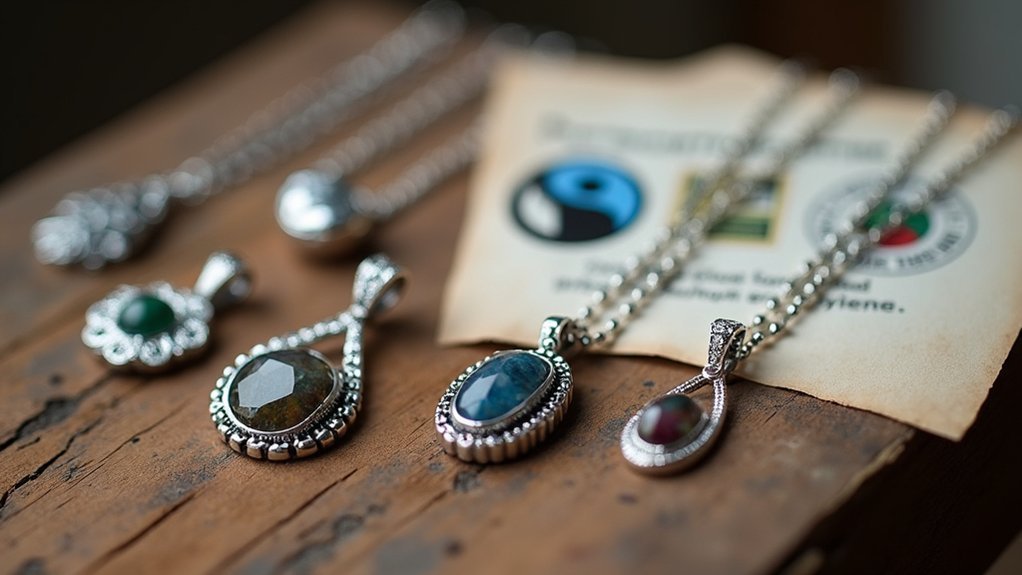
When sourcing fair trade silver jewelry, you’ll need to verify that your suppliers hold legitimate certifications like Fairmined and Fairtrade, which guarantee ethical mining practices and fair compensation throughout the silver supply chain.
Don’t stop there—confirm your suppliers meet Responsible Jewelry Council standards, which promote workers’ rights and environmental protection throughout the jewelry industry.
You should demand transparency from potential partners regarding their silver sourcing origins and mining conditions.
Ask suppliers to provide documentation proving their commitment to sustainability, including reduced emissions and energy consumption during production.
Look for companies that publish annual reports detailing their fair trade practices, as this signifies accountability and ongoing improvement efforts.
These certifications aren’t just badges—they’re your assurance that your business supports ethical practices while protecting miners and the environment.
Research the Silver’s Country of Origin and Mining Practices
Where does your silver originate, and what mining practices shaped its journey to your jewelry?
You’ll want to investigate your silver’s country of origin to understand local mining regulations and labor standards. Different nations maintain varying environmental impact and fair labor practices requirements.
Look for certifications like Fairmined and Fairtrade, which verify ethical sourcing from responsible mines.
Research the specific mining methods used—artisanal mining and small-scale mining operations typically generate lower environmental impacts than large industrial operations.
Consider silver from regions known for ethical practices, such as Bolivia or Colombia, where established community development programs support miners and their families.
These responsible operations often contribute to improved living conditions and social development in mining communities.
Evaluate Labor Conditions and Worker Compensation
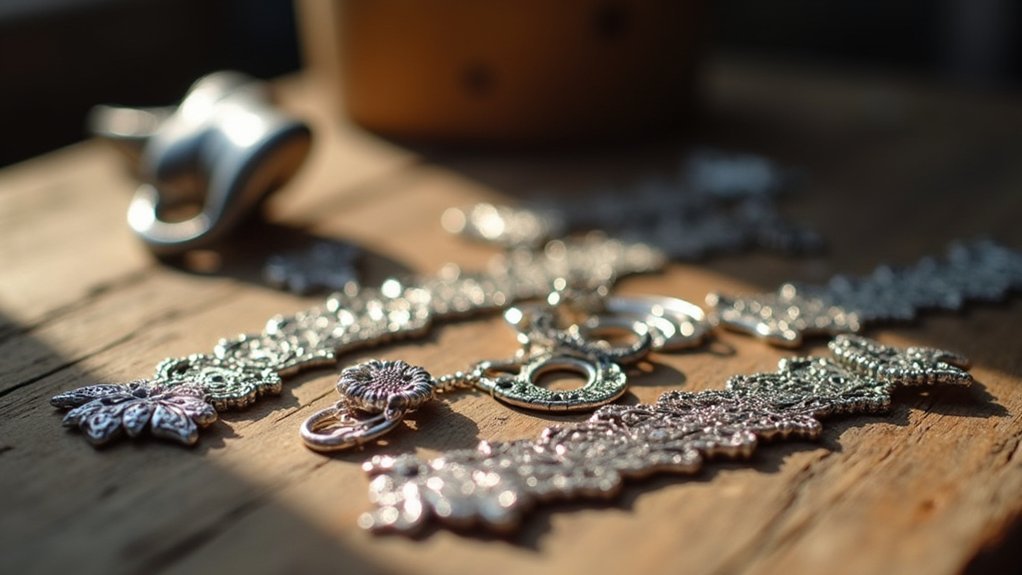
After identifying ethical silver sources, you’ll need to examine the actual working conditions and compensation structures that affect miners throughout the supply chain.
Look for Fair Trade certifications from organizations like Fairmined and Fairtrade, which guarantee workers receive at least 50% increased income compared to traditional mining wages. These certifications require transparency in labor conditions and enforce rigorous safety standards to protect workers from hazardous environments.
Verify that brands conduct regular audits to confirm compliance with worker rights and fair wages.
Since up to 80% of artisanal miners work in unsafe conditions, prioritize companies committed to ethical sourcing. Responsible sourcing practices should fund community development initiatives that improve living conditions and provide access to education and healthcare for mining communities.
Choose Recycled Silver Over Newly Mined Materials
Beyond ensuring fair labor practices, you can greatly reduce mining’s environmental impact by choosing recycled silver jewelry.
Your sourcing practices should prioritize recycled materials that use 90% less energy than newly mined silver, dramatically reducing your carbon footprint.
About 92.5% of sterling silver sustainable jewelry can be made from recycled silver without compromising quality and durability.
This ethical jewelry maintains identical standards while minimizing energy consumption and water usage during production.
When you choose recycled silver, you’re preventing deforestation and pollution caused by mining operations.
You’re also supporting a circular economy where materials get reused and repurposed rather than discarded.
This approach reduces waste while promoting sustainability throughout the jewelry industry, making your purchases environmentally responsible.
Assess Environmental Impact and Sustainability Practices
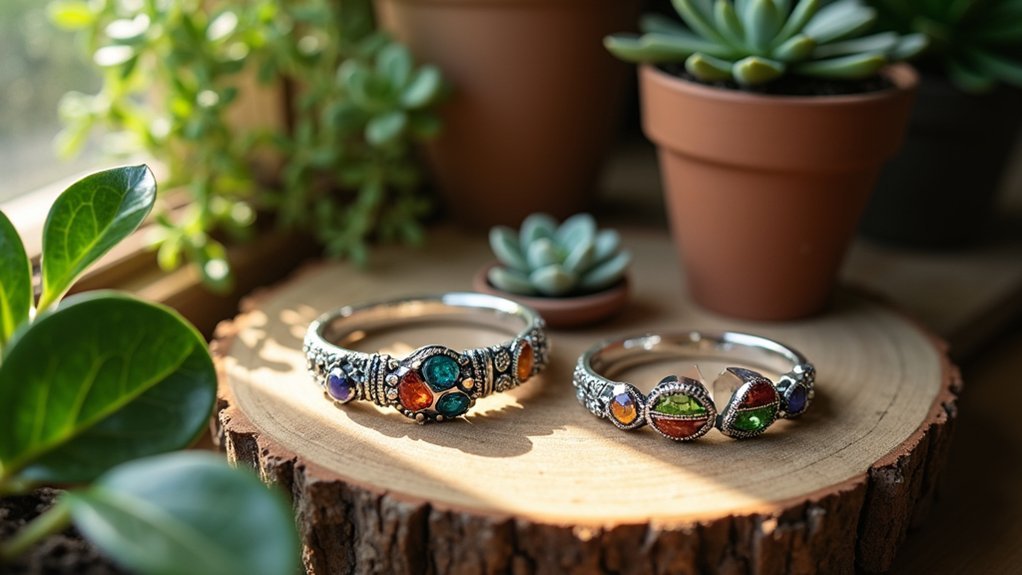
When you’re evaluating fair trade silver jewelry, you must examine the thorough environmental footprint of your supplier’s sourcing practices. Fair Trade silver comes from certified mines implementing sustainable practices that minimize ecological consequences like habitat destruction and water pollution.
Traditional mining activities generate approximately 180 million tons of toxic waste annually, making responsible sourcing essential for environmental protection.
You’ll want to verify that suppliers support local communities through profit reinvestment, fostering sustainable economic growth rather than destructive extraction methods.
Build Relationships With Transparent Supply Chain Partners
You’ll need to verify that your suppliers hold legitimate certifications like Fairtrade or Fairmined before committing to any partnerships.
Establish direct communication channels with these suppliers to understand their sourcing processes, working conditions, and community impact firsthand.
This transparency guarantees you’re building relationships with partners who genuinely prioritize ethical practices rather than just marketing claims.
Verify Supplier Certifications
How can you guarantee the silver jewelry you’re sourcing truly meets fair trade standards?
You must verify that your supplier holds recognized certifications like Fairmined or Fairtrade, which confirm ethical practices and fair wages for miners.
Don’t accept claims without proof—demand transparency in their sourcing documentation and certification records.
Look for suppliers who undergo regular third-party audits to maintain their credentials.
These audits verify compliance with environmental and labor standards, creating accountability throughout the supply chain.
Additionally, prioritize working with suppliers who are members of the Responsible Jewelry Council, demonstrating their commitment to sustainable practices.
When you verify supplier certifications properly, you’re not just protecting your business reputation—you’re supporting ethical mining communities and responsible sourcing practices that benefit everyone involved.
Establish Direct Communication
Beyond verifying certifications on paper, establishing direct communication with your suppliers creates the foundation for truly transparent partnerships.
When you establish direct communication, you’ll gain valuable insights into their sourcing practices and verify the ethical standards they maintain. This transparent supply chain approach allows you to confirm suppliers truly adhere to Fairtrade principles rather than merely displaying credentials.
Regular dialogue about sourcing certifications like Fairmined helps guarantee alignment with your values.
Consider visiting supplier operations to witness their ethical practices firsthand. These relationships enable sustainable sourcing that benefits the communities involved in silver production.
Support Community Development and Artisan Programs
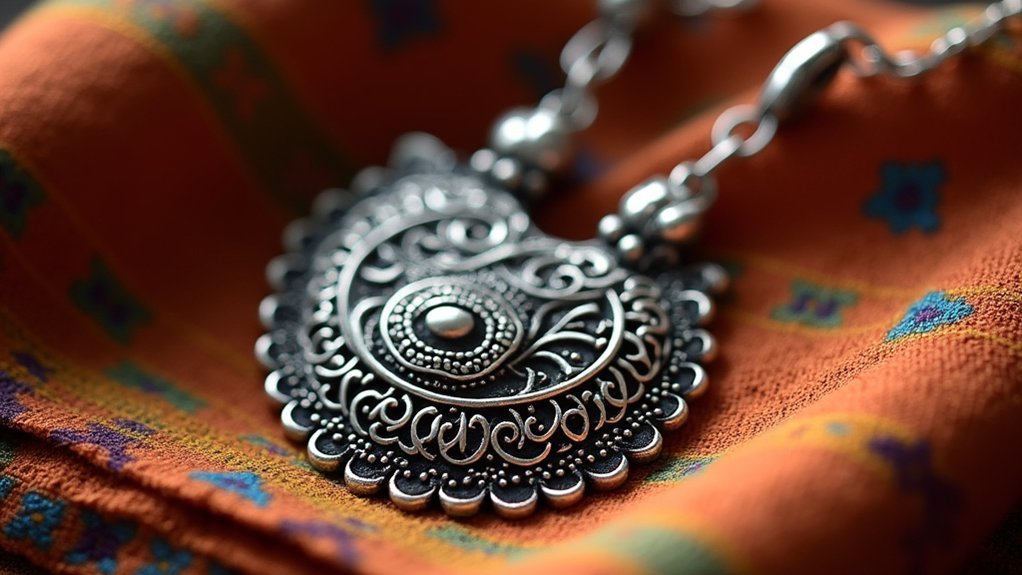
When you purchase fair trade silver jewelry, you’re directly empowering local mining communities by ensuring miners receive fair wages that improve their living conditions and economic stability.
Your support enables artisan training programs that teach valuable skills, creating sustainable employment opportunities for community members.
These investments help communities develop essential infrastructure like clean water access, healthcare facilities, and educational resources that benefit entire families for generations.
Empowering Local Mining Communities
While traditional mining often leaves communities struggling with poverty and unsafe conditions, sourcing fair trade silver jewelry directly empowers local mining communities through sustainable economic development.
When you choose Fairtrade certification, you’re ensuring artisanal miners receive fair wages and safe working conditions that foster economic stability throughout their regions.
Your purchase supports community development through premium allocations that fund essential projects like schools and health clinics.
Artisanal miners form cooperatives, collectively negotiating better prices and sharing resources to increase earnings.
You’re helping reduce poverty—certified mines can triple miners’ average income compared to traditional practices.
Supporting Artisan Training Programs
Through supporting artisan training programs, you’re investing in skill development that transforms local communities into centers of exceptional craftsmanship. These initiatives directly enhance fair trade silver jewelry quality while teaching sustainable practices and responsible sourcing methods to local artisans.
| Training Focus | Community Impact | Economic Outcome |
|---|---|---|
| Skilled craftsmanship techniques | Enhanced product quality | Higher jewelry prices |
| Environmental stewardship methods | Reduced ecological footprint | Sustainable income streams |
| Collaborative networks building | Stronger community bonds | Collective market advocacy |
| Responsible sourcing education | Ethical mining practices | Improved economic stability |
Your support enables artisans to command premium prices for expertly crafted pieces, creating lasting economic stability. These programs foster collaborative networks where communities share best practices and advocate collectively for fair trade principles. Investment in artisan training ultimately drives thorough community development, improving access to education, healthcare, and infrastructure throughout local populations.
Frequently Asked Questions
How to Ethically Buy Jewelry?
You should research certifications like Fairtrade, choose transparent brands, buy recycled materials, support local artisans, and seek recommendations from trusted sources to guarantee you’re purchasing ethically-made jewelry.
What Is Ethically Sourced Silver?
Ethically sourced silver comes from mines that guarantee fair wages, safe working conditions, and environmental protection. You’ll find it through Fairmined certification or recycled materials that support sustainable practices.
What Is the Most Ethical Jewelry Brand?
You’ll find Brilliant Earth stands out as the most ethical jewelry brand, using 93% recycled metals and lab-grown diamonds while maintaining Responsible Jewelry Council certification for sustainable practices.
What Is the Most Sustainable Metal for Jewelry?
You’ll find recycled silver is the most sustainable jewelry metal. It reduces mining needs by 95%, cuts carbon emissions dramatically, and utilizes existing materials while maintaining sterling silver’s quality and durability.
In Summary
By following these seven strategies, you’ll transform your jewelry sourcing into a force for positive change. You’re not just purchasing silver—you’re supporting ethical mining practices, fair wages, and sustainable communities. Each piece you choose becomes a statement about your values and commitment to responsible business. Start implementing these tips today, and you’ll build a supply chain that reflects your dedication to both quality craftsmanship and social responsibility.

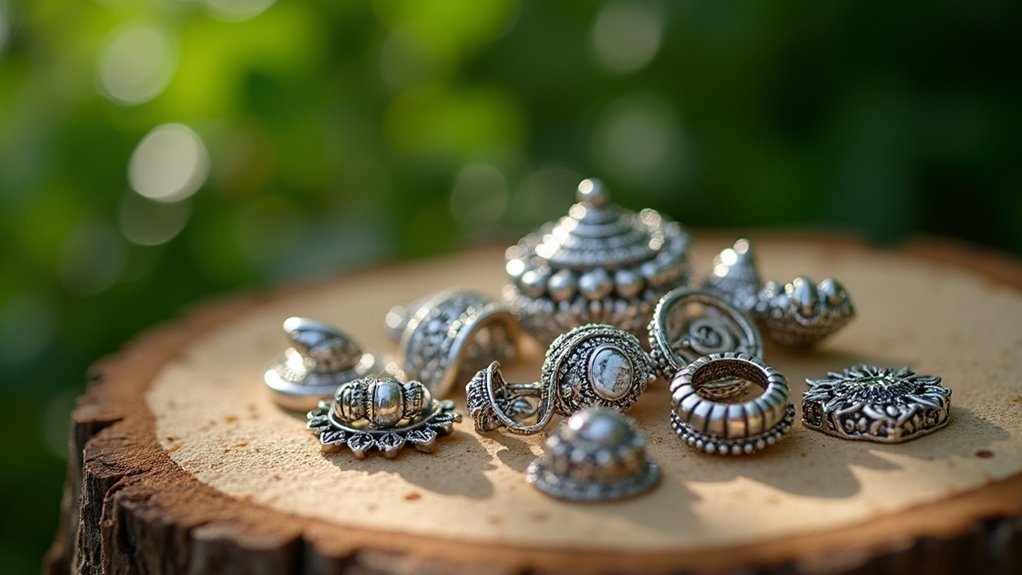

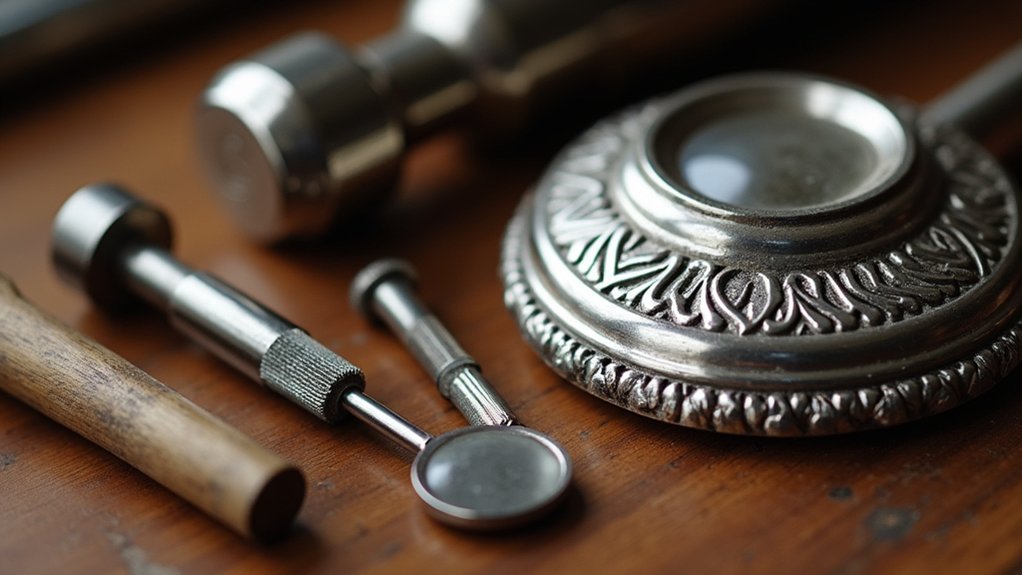
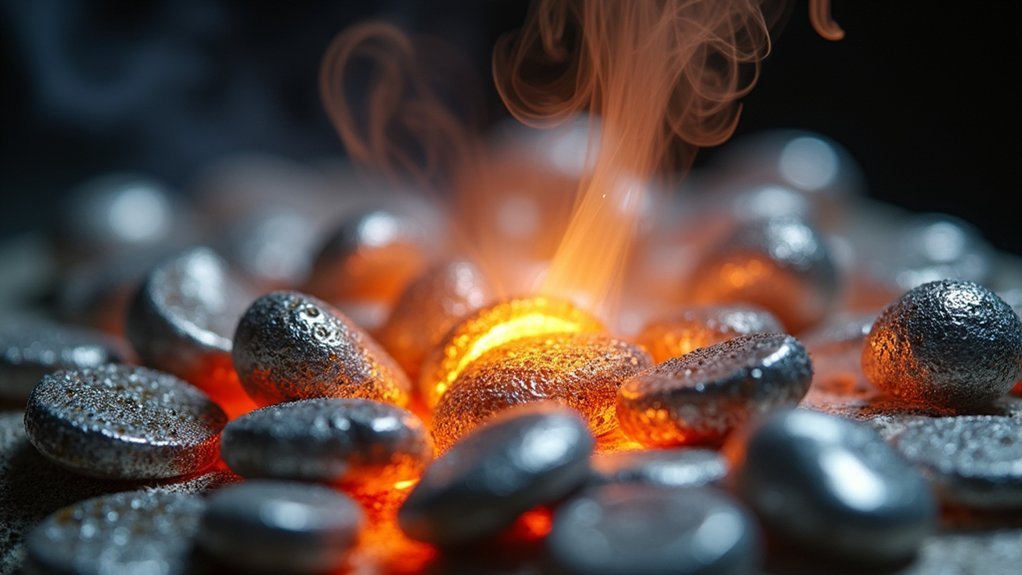
Leave a Reply